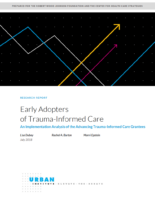Early Adopters of Trauma-Informed Care: An Implementation Analysis of the Advancing Trauma-Informed Care Grantees
Source: Urban Institute
Report | July 2018

Health care providers increasingly recognize how an individual’s history of trauma may influence his or her health, relationships, and ability to adopt healthy behaviors. Trauma includes exposure to things such as abuse, neglect, discrimination, and violence, which can have a direct impact on lifelong health and well-being. This report examines implementation strategies at six pilot sites and identifies the key characteristics that define a trauma-informed organization, as well as barriers and facilitators to adopting trauma-informed practices across various settings.
Posted: July 2019